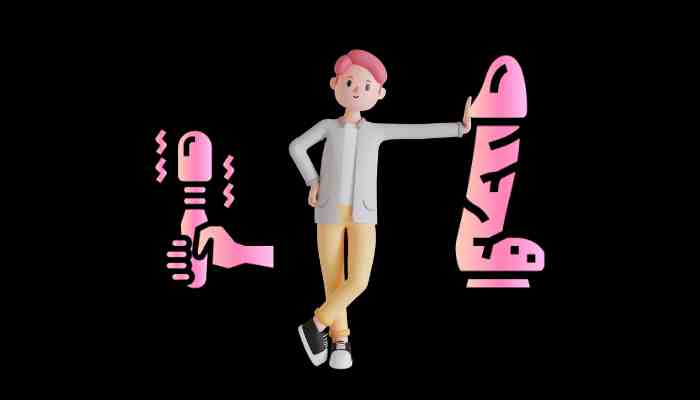How to Stop Masturbating? – Masturbation is a natural and common human behavior. It’s a normal part of many people’s lives, but for some, it can become a habit that they wish to reduce or eliminate. Whether you’re trying to curb this behavior due to religious, personal, or health reasons, it’s important to approach the journey with understanding and compassion. In this guide, we will discuss practical steps and strategies to help you stop masturbating while maintaining a friendly and non-judgmental tone.
How to Stop Masturbating?

Step 1: Self-Compassion
The first step in any change is to practice self-compassion. Masturbation is not something to be ashamed of, and self-criticism won’t help you in your journey. Understand that you are not alone in this, and many people have gone through similar experiences.
Step 2: Understand Your Motivation
Before you embark on this journey, it’s essential to understand why you want to stop masturbating. Your motivation can be deeply personal and may include reasons related to your physical or mental health, relationship dynamics, religious beliefs, or personal goals. Knowing your “why” will help you stay committed.
Step 3: Educate Yourself
Understanding the physical and psychological aspects of masturbation can be helpful. This knowledge can demystify the process and assist in controlling the urge. Realize that it’s a normal bodily function, and there’s no harm in occasional masturbation.
Step 4: Identify Triggers
Identify the situations or emotions that trigger your urge to masturbate. Common triggers may include stress, boredom, loneliness, or exposure to explicit content. By recognizing these triggers, you can take proactive steps to avoid or manage them.
Step 5: Develop Healthy Habits
Replace the habit of masturbation with healthier alternatives. Engage in activities that keep you busy and fulfilled. Exercise, hobbies, and socializing can help fill the void left by the absence of masturbation.
Step 6: Create a Support System
Talk to friends, family, or a therapist about your decision to stop masturbating. Having a support system can be incredibly valuable in helping you stay accountable and navigate challenges along the way.
Step 7: Set Realistic Goals
Breaking any habit is a journey, and it’s important to set achievable goals. Instead of aiming to quit cold turkey, start with reducing frequency and gradually work towards your ultimate goal.
Step 8: Find Healthy Outlets for Sexual Energy
Channel your sexual energy into more productive avenues. This can include building emotional connections with a partner, engaging in intimate non-sexual activities, or pursuing creative endeavors.
Step 9: Mindfulness and Self-Control
Practicing mindfulness can be a powerful tool to regain control over your impulses. Meditation and deep breathing exercises can help you manage urges when they arise.
Step 10: Be Patient and Forgive Yourself
Relapses may happen, and that’s okay. It’s essential to be patient with yourself and not be too hard on your setbacks. Learn from them and use them as opportunities for growth.
Conclusion
Breaking free from the habit of masturbation is a personal journey that requires patience, self-compassion, and determination. Remember that there is no one-size-fits-all approach, and it’s essential to find the strategies that work best for you. Seek professional help if you find it challenging to control your urges or if your habit is causing emotional distress. You are not alone in this journey, and you have the strength to overcome this challenge while maintaining a positive and understanding attitude towards yourself

15 Tips to Overcome Compulsive Masturbation
Masturbation is a natural and healthy form of sexual expression, but when it becomes compulsive, it can lead to negative impacts on physical, mental, and social well-being. If you or someone you know is struggling with compulsive masturbation, this blog offers 15 practical tips based on expert advice to help overcome this challenge. Remember, it’s crucial to approach this topic with understanding and seek professional help if needed.
1. Talk About It with a Trusted Confidant
Start by opening up to a trusted friend or partner about your struggles. Speaking about it can provide emotional support and help you track your progress. Remember, you’re not alone in this.
2. Seek Professional Help
If you find that compulsive masturbation is causing emotional distress, consider reaching out to a therapist or addiction specialist. They can provide tailored guidance and support for your unique situation.
3. Understand the Signs
Recognize the signs of problematic masturbation, such as excessive time spent on it, disruption of daily life, and engaging in the behavior even when unaroused. Identifying these signs is the first step toward change.
4. Limit Time Alone
Reducing the amount of time spent alone can help decrease opportunities for masturbation. Engage in social activities, hobbies, or simply limit your alone time to control the urge.
5. Stop Watching Porn
If pornography is a trigger for you, consider reducing or eliminating its consumption. This can help break the cycle of compulsive masturbation associated with porn.
6. Change Your Routine
Break the habit by changing your daily routine. If you typically masturbate at specific times, engage in different activities during those times to create a distraction.
7. Meditate
Practicing meditation can help redirect your thoughts and calm your urges. Focus on positive thoughts and deep breathing to help reduce the desire to masturbate.
8. Utilize Unstimulating Visualizations
Shift your focus away from arousing thoughts by imagining non-stimulating scenarios. This can help distract your mind from the urge.
9. Implement Healthy Distractions
Engage in activities that require your full attention, like reading a book, playing a board game, or going out with friends. Healthy distractions help redirect your energy.
10. Exercise Regularly
Exercise not only improves physical health but also boosts your mood and reduces tension. It’s a great way to keep your mind and body occupied and improve your overall well-being.
11. Set Goals and Track Progress
Start with small, achievable goals to gradually reduce the frequency of masturbation. Track your progress and build confidence as you succeed.
12. Consider Your Beliefs and Values
If you have religious or cultural beliefs that influence your view on masturbation, reflect on how they align with your personal values. Seek guidance from a trusted religious leader or a culturally competent professional.
13. Wear Extra Clothes at Night
Limit accessibility by wearing extra layers of clothing at night. This can create an additional barrier and provide more time to manage your urges.
14. Work on Self-Improvement
Focus on self-improvement in other areas of your life, such as education, career, or relationships. This can help redirect your energy and boost your self-esteem.
15. Stay Committed
Lastly, remember that change takes time. Stay committed to your journey, and don’t be too hard on yourself if you face setbacks. Seek professional help and support when needed.
Conclusion
Compulsive masturbation can have a significant impact on your life, but with determination, support, and these 15 tips, you can work towards overcoming this challenge. Remember that you’re not alone, and there are resources available to help you on your journey to a healthier, more balanced life.
- Talk About It With Your Romantic Partner or Others You Trust
Discussing your struggles with problematic masturbation is a significant and often challenging step in your journey towards overcoming this habit. Here’s an in-depth look at why this is important and how it can be beneficial:
Open Communication is Key:
One of the most crucial aspects of any relationship, especially a romantic one, is open and honest communication. Addressing the issue of problematic masturbation with your partner demonstrates trust and vulnerability. It’s important to emphasize that you’re sharing this because you trust and value their input.
Emotional Support:
When you confide in your partner or a trusted friend, you open the door to receiving emotional support. They can provide you with encouragement, understanding, and a listening ear. Knowing that someone is there for you can be a tremendous relief, as you don’t have to face the challenge alone.
Accountability:
Sharing your goal to overcome compulsive masturbation with someone you trust can also create a sense of accountability. When someone is aware of your journey, they can help you track your progress and offer gentle reminders if they notice you struggling. This can be especially helpful when you feel tempted to fall back into old habits.
Breaking the Taboo:
Masturbation is often seen as a taboo subject, and discussing it openly can be uncomfortable. However, it’s essential to remember that it’s a common and natural behavior. Most people have experience with it, which means your confidant is likely to understand more than you might expect. By breaking the silence, you contribute to reducing the stigma around this topic.
Addressing Underlying Issues:
Sometimes, problematic masturbation is a symptom of deeper issues within a relationship. It could be related to a lack of physical intimacy, emotional disconnect, performance anxiety, or other negative emotions. By discussing it openly, you can work together to address these underlying issues. This can lead to a more profound understanding of each other’s needs and can help you both grow as a couple.
The Role of Sex Therapy:
In some cases, it might be beneficial to seek the help of a sex therapist. Sex therapy can provide a safe and constructive environment to explore and address issues related to sexual behavior, desires, and challenges. A therapist can help you and your partner work through any difficulties, improve your physical intimacy, and find ways to support each other in your journey to overcome problematic masturbation.
In conclusion, talking about your struggles with problematic masturbation is a courageous and necessary step in your path towards positive change. It can lead to emotional support, improved communication with your partner, and addressing the root causes of compulsive behavior. Remember that you don’t have to face this challenge in isolation, and reaching out to someone you trust can be a significant source of strength and motivation
Top 10 Reasons people masturbate
Masturbation is a common and natural form of sexual expression. People may engage in masturbation for various reasons, and it can serve a range of purposes. Here are the top 10 reasons why people masturbate:
- Stress Relief: Masturbation can provide a sense of relaxation and stress relief. It triggers the release of endorphins, which can reduce anxiety and promote a sense of well-being.
- Exploration and Self-Discovery: Many individuals use masturbation as a means to explore their own bodies and learn about what brings them pleasure. This self-discovery can be an essential aspect of developing a healthy sexual identity.
- Aid in Sleep: Some people find that masturbation helps them fall asleep more easily. The physical and emotional release it provides can promote better sleep quality.
- Physical Pleasure: The most obvious reason people masturbate is for the physical pleasure it brings. Masturbation can result in sexual gratification, which is a natural and enjoyable part of human sexuality.
- Release of Sexual Tension: Masturbation is a healthy way to release sexual tension when one is not in a sexual relationship or when sexual activity is not an option for any reason.
- Pain Relief: For some individuals, masturbation can alleviate certain types of pain, such as menstrual cramps in women. It’s believed that the endorphins released during orgasm have pain-relieving properties.
- Improving Sexual Function: Masturbation can serve as a means to improve sexual function. It helps individuals become more in touch with their own bodies and can enhance sexual performance in partnered activities.
- Body Image and Self-Confidence: Engaging in masturbation can boost self-confidence and help individuals feel more comfortable with their bodies, which, in turn, can have a positive impact on their sexual experiences with a partner.
- Lack of Sexual Partner: Some people may masturbate because they are not in a sexual relationship or because their partner is unavailable. It allows them to fulfill their sexual needs in a solo capacity.
- Curbing Sexual Desire: On the flip side, some individuals may use masturbation to reduce sexual desire temporarily. This can be particularly relevant for people who are practicing abstinence or have chosen to remain celibate for a period of time.
It’s essential to remember that masturbation is a personal choice, and it’s entirely normal and healthy. However, if it becomes compulsive or interferes with daily life and responsibilities, it may be worth exploring strategies to manage it effectively. Each person’s experience with masturbation is unique, and the reasons for engaging in it can vary widely
Aid in Sleep: Some people find that masturbation helps them fall asleep more easily. The physical and emotional release it provides can promote better sleep quality.
For some individuals, masturbation serves as a sleep aid, and it’s not uncommon for people to experience better sleep after engaging in this activity. Here’s a more in-depth look at why this happens:
1. Relaxation and Stress Reduction: Masturbation can trigger the release of endorphins, which are natural chemicals that promote feelings of relaxation and well-being. This physiological response to sexual pleasure can help reduce stress and anxiety, which are common barriers to falling asleep. When we’re less stressed, we’re more likely to drift into slumber peacefully.
2. Improved Mood: The emotional release that comes with orgasm can lead to an improved mood, making it easier to transition into a calm and content state conducive to sleep. This positive emotional state can counteract feelings of restlessness or worry that may interfere with falling asleep.
3. Pain Relief: Some individuals experience mild to moderate pain or discomfort, which can be eased by masturbation. For example, in women, the release of endorphins during orgasm may help alleviate menstrual cramps, making it easier to relax and sleep.
4. Physical Exhaustion: Masturbation, like any physical activity, can leave the body feeling physically exhausted. This physical tiredness can contribute to an increased desire to sleep and promote a more restful slumber.
5. Distraction: Engaging in masturbation can serve as a distraction from intrusive or anxious thoughts that often hinder sleep. Focusing on the pleasurable sensations and the experience itself can divert one’s attention away from racing thoughts.
6. Release of Sexual Tension: In some cases, sexual tension can build up during the day, especially if a person is abstaining from sexual activity. Masturbation can release this tension, which can create a sense of relief and relaxation, making it easier to fall asleep.
7. Routine and Habit: For some individuals, incorporating masturbation into their bedtime routine signals the body that it’s time to wind down and prepare for sleep. The predictability of this routine can help condition the body for better sleep.
While masturbation can have sleep-inducing benefits for many people, it’s important to note that its impact on sleep can vary from person to person. What works for one individual may not work for another. Additionally, the timing and frequency of masturbation may play a role in its effectiveness as a sleep aid. Some individuals may find that engaging in this activity too close to bedtime could have the opposite effect, as the body may become more alert following orgasm.
In conclusion, for some people, masturbation can be a valuable tool in promoting better sleep quality. The physical and emotional release it provides, coupled with its relaxation-inducing effects, can help individuals ease into slumber more peacefully. However, it’s essential to recognize that sleep is a complex and individualized process, and what works for one person may not necessarily work for another
Speak With a Professional: Your Path to Stop Masturbating
When facing the challenge of compulsive masturbation, reaching out to a professional can be a transformative step towards understanding and managing this behavior. Here’s an in-depth look at why speaking with a therapist or addiction specialist is crucial and how it can guide you towards recovery:
1. Confidentiality and Trust:
One of the fundamental benefits of speaking with a licensed therapist is the assurance of confidentiality. What you discuss in therapy is protected within certain legal limits, which creates a safe and non-judgmental space for you to openly share your struggles, thoughts, and emotions. Trust is a vital component of the therapeutic relationship, and knowing that your conversations will remain private can encourage greater openness.
2. Specialized Knowledge and Expertise:
Therapists and addiction specialists have extensive training and expertise in understanding and addressing addictive behaviors, including compulsive masturbation. They are equipped with the knowledge and tools to help you recognize the underlying causes of your behavior and develop strategies to manage and ultimately overcome it.
3. Personalized Guidance:
Every individual’s experience with compulsive masturbation is unique, and a professional can offer personalized guidance tailored to your specific needs and challenges. They can help you identify the triggers, emotions, or situations that drive your behavior and work with you to develop a customized plan for change.
4. Addressing Co-Occurring Issues:
It’s not uncommon for individuals struggling with addiction, including compulsive masturbation, to also experience co-occurring mental health issues such as anxiety, depression, or shame. These internalized challenges can exacerbate addictive behaviors and create a cycle that’s difficult to break. A therapist can assist you in addressing these co-occurring issues, providing support and interventions to improve your emotional well-being.
5. Root Cause Identification:
Therapists and addiction specialists can help you identify the root causes of your compulsive behavior. It’s often not just about the behavior itself but about the underlying emotional, psychological, or environmental factors that drive it. By addressing the root causes, you can work towards sustainable change.
6. Comprehensive Treatment:
For individuals struggling with addiction, it’s essential to consider a comprehensive treatment approach. This involves addressing both the addictive behavior and any co-occurring mental health conditions. Failing to do so can lead to negative interactions between these conditions, hindering your progress. Therapists are skilled in recognizing and managing these interactions, helping you create a well-rounded treatment plan.
7. Consistency and Commitment:
Breaking free from compulsive behaviors like excessive masturbation often requires consistent effort and commitment. A professional can guide you through the process, providing ongoing support, motivation, and strategies to help you stay on track. They can help you develop healthier coping mechanisms and life skills to replace the behavior.
In conclusion, speaking with a professional, such as a therapist or addiction specialist, is a vital step on your journey to overcome compulsive masturbation. Their expertise, personalized guidance, and commitment to confidentiality create a supportive environment for you to explore the underlying causes of your behavior and work towards sustainable change. Remember that reaching out for help is a courageous and proactive step towards healing and personal growth

Masturbation is indeed a normal part of sexual expression for many people and can have various benefits, including stress relief and helping individuals better understand their own sexual preferences. However, as you mentioned, it can become a problem when it interferes negatively with a person’s life or well-being. Here are some key points to consider:
- Reasons to Stop Masturbating:
- Negative Interference: When masturbation starts interfering with important aspects of life, such as work, relationships, or social interactions.
- Health Concerns: In rare cases, frequent or vigorous masturbation can lead to physical issues, such as skin irritation or swelling of the penis.
- Emotional Distress: Some individuals may experience negative emotions like guilt or shame related to masturbation.
- Ways to Stop or Reduce Masturbation:
- Avoid Pornography: Limiting exposure to pornography, which can trigger the desire to masturbate.
- Stay Active: Engaging in physical activities or picking up new hobbies to divert attention and energy.
- Seek Professional Help: If masturbation is negatively impacting life, consulting with a mental health professional who specializes in human sexuality can be beneficial.
- Spend Time with Others: Reducing feelings of loneliness and increasing social engagement can help reduce opportunities for masturbation.
- Exercise: Physical activity can lower tension and promote feelings of well-being, potentially reducing the urge to masturbate.
- Join a Support Group: Connecting with a support group can provide a safe space to discuss concerns and develop coping strategies.
- Potential Side Effects:
- Masturbation typically does not have harmful side effects, but excessive or compulsive masturbation may lead to issues like edema, skin irritation, or intense guilt.
- When Is Masturbation a Problem:
- Masturbation becomes problematic when it negatively affects an individual’s life, causing distress or interfering with their relationships and responsibilities.
- Compulsive behavior: When masturbation becomes a compulsion, leading to intense preoccupation and distress, it may be considered a mental health issue.
- Feelings of Guilt: Some people may experience significant guilt after masturbation, which can lead to other issues, such as increased alcohol use.
In summary, while masturbation is a normal and healthy sexual practice for most people, it’s important to recognize when it becomes problematic and takes a toll on one’s life. Seeking professional help can be a valuable step for those experiencing compulsive or distressing patterns of masturbation, as it may be related to underlying psychological or emotional issues

It’s important to note that masturbation is a normal and healthy activity for most people. However, if you feel that it’s interfering with your daily life or causing distress, and you want to reduce or stop it, here are some tips to help you:
- Seek Professional Help:
- Consider talking to a therapist, counselor, psychologist, or psychiatrist who specializes in sexual health. They can provide guidance and support tailored to your specific needs.
- Be Honest About Your Feelings:
- If you have guilt or negative feelings associated with masturbation, discuss these emotions with your therapist or healthcare provider. Understanding the root causes can be an essential step in addressing the issue.
- Be Patient:
- Changing a behavior that feels out of control takes time. Be patient with yourself and the process, as it may require weeks or even months to see progress.
- Stay Busy:
- Keeping a full schedule can reduce the opportunities for masturbation. Engage in activities that are engaging, self-soothing, or exciting to occupy your time.
- Take Care of Your Body:
- A healthy diet and regular exercise can help reduce sexual urges and provide motivation to resist. Taking better care of your overall well-being can redirect your focus and energy.
- Develop Strategies:
- Identify the times or situations when you are most likely to masturbate. Work with your therapist to create plans and alternative activities to overcome the urge.
- Find a Support Group:
- Support groups can provide accountability and help you develop new behaviors. Ask your therapist or healthcare provider about local or online support groups.
- Limit Alone Time:
- Try to move activities you typically do alone to public spaces to reduce opportunities for masturbation. Engaging in social activities or hosting events at your home can help.
- Wear Extra Clothes at Night:
- Wearing additional layers of clothing can create a physical barrier and reduce the likelihood of unintentional stimulation.
- Stop Watching Pornography:
- If pornography triggers your urges, take measures to avoid it. Dispose of any explicit content, move your computer to a public area, or use porn-blocking software to limit access.
- Be Patient and Persistent:
- Behavior change takes time and effort. Expect setbacks along the way and stay committed to your goal of healthier sexual behaviors.
Remember, the goal is not to vilify or demonize masturbation but to create a healthier relationship with your sexual activity. Consult with a healthcare professional for personalized guidance and support. It’s essential to prioritize your mental and emotional well-being throughout this process








